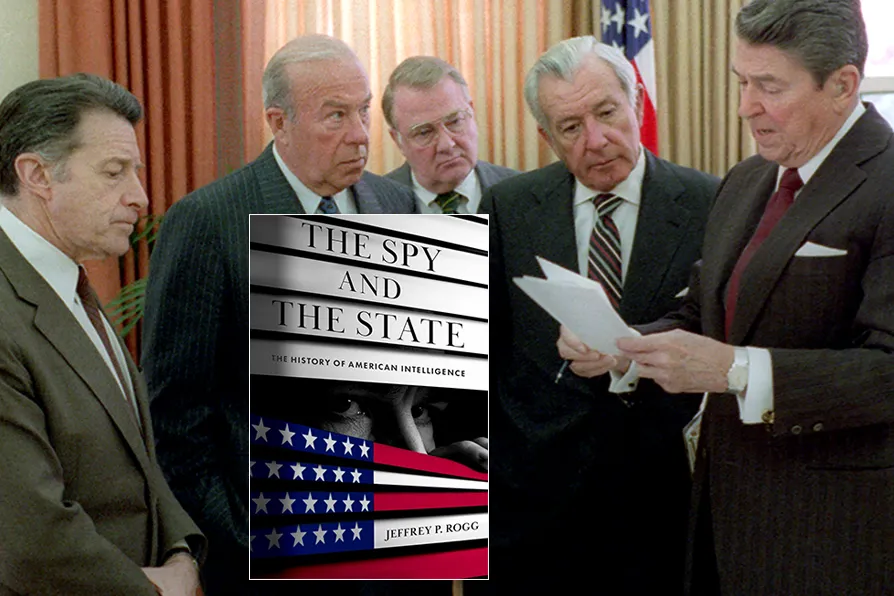JOHN GREEN, MARIA DUARTE and ANGUS REID review Fukushima: A Nuclear Nightmare, Man on the Run, If I Had Legs I’d Kick You, and Cold Storage
With reservations, RON JACOBS recommends a deep dive into the nature, history, and mindset of US intelligence

 Ronald Reagan with (L-R) Caspar Weinberger (subsequently criticised by the Tower Commission report) George Shultz, Ed Meese, and Don Regan, discussing The President's Remarks on The Iran-Contra Affair [Pic: White House Photographic Collection/CC]
Ronald Reagan with (L-R) Caspar Weinberger (subsequently criticised by the Tower Commission report) George Shultz, Ed Meese, and Don Regan, discussing The President's Remarks on The Iran-Contra Affair [Pic: White House Photographic Collection/CC]
The Spy and the State: The History of American Intelligence
Jeffrey P Rogg, OUP USA, £30.99
As suggested by the title, this book is a fairly deep history of US intelligence from its beginnings during the war for independence up to the early days of the Biden administration.
Broken into sections focusing on certain historical watersheds — the early days of the nation, the civil war, the beginning of overseas colonization, World War One, World War Two, the cold war and the 30 years since the fall of the Soviet Union — the text is comprehensive and well-sourced.
The author is Jeffrey P Rogg, a professor who has spent his teaching years in schools and departments focused on (and usually funded) by the US military and intelligence establishments. His level of knowledge in this regard is vast and it seems reasonable to suggest his contacts provide him with access not available to those on the outside of those establishments. Consequently, his history is probably deeper than most others addressing the topic.
It is also considerably less critical than books like the CIA defector Philip Agee’s Inside the Company or former CIA analyst Victor Marchetti’s The CIA and the Cult of Intelligence. In fact, most of Rogg’s criticism focuses on departmental inefficiencies, competition between agencies, and the misuse of the agencies by politicians in the White House and Congress. A prime example of the latter would be what became known as the Iran-Contra Affair.
The Spy and the State does not challenge US foreign policy. In fact, the author’s mostly objective presentation unravels in the chapter titled “The Executive Strikes Back” which covers the period of Reagan presidency. Rogg’s discussion of the wars in Central America repeats questionable anti-communist tropes claiming that Nicaragua’s Sandinistas funded the El Salvador armed movement FMLN, even while the Sandinistas were struggling to remake the government of Nicaragua and fighting a US-created and funded mercenary force called the Contras.
Similar allegations were dismissed by more objective observers at the time mostly because they ascribed means and resources far beyond Sandinista capabilities.
Furthermore, his assertion that the CIA operation in Afghanistan was a “success” in that it contributed to the Soviet defeat there rings quite false. To make this claim in 2025 is not merely disingenuous; it’s offensive in light of everything that has happened in that country and to its population since that operation.
After the end of the Soviet Union public discussion of the role of intelligence agencies rose in the US after its enemy was gone. Liberal and even leftist friends considered the possibility of the end of the CIA and a reduction in size at the NSA and other agencies. The US and especially its military and intelligence sectors would find and create new enemies.
Ten years later, the so-called global war on terror began. This was an enemy who might last forever, a war profiteer’s dream and a paranoid government agency’s paradise. Sure enough, soon it seemed like the CIA was fighting more wars than the military and doing so with the full support of the White House and the majority of Congress.
Naturally, many people who lived in the lands the CIA had chosen to attack were killed just because they were present when an attack occurred. Over at the NSA, the budget was expanding almost as quickly as the surveillance it was doing; surveillance enhanced by the advances in computer and communications technology.
Spy Against the State is neither an exposé nor an attack on the US intelligence complex. Nor does it question the foci of its work. That being said, it does provide a deep dive into the history of US espionage and covert operations; their antidemocratic nature, the desire of the powerful to use them for their own purposes; and their role in making the world safer for them at the expense of people, popular movements, and even nations.
Textually dense at times, it is worth the effort for those whose interests include understanding the nature, history, and mindset of US intelligence.
Ron Jacobs’ latest book, Nowhere Land: Journeys Through a Broken Nation, is now available. He can be reached at: ronj1955@gmail.com









